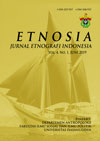Nature as Culture of Penghayat: The Landscape, Reaction, and Movement of Penghayat in Cilacap
DOI:
https://doi.org/10.31947/etnosia.v4i2.7653Keywords:
Nature, culture, Penghayat, landscape, movement, Ethnography.Abstract
This article aims to explain how Penghayat does not remain silent when their views and their ritual practice are questioned. This paper explains about Penghayat views that nature as a looking way in their daily lives and practices. They use metaphors such as folksong or traditional art contained in nature to interaction and reaction, not only with their members/citizens (self) but also with other people (others). They have knowledge about nature presenting and functioning. The knowledge of the Jagad Gumelar ginulung in Jagad Alit is the blueprint, as guiding, from their Kaki and Nini (ancestors) spoken. With ethnographic research and landscape discourse, the author reveals how nature is seen as a culture in society. The rituals show how the values of the role of nature, both the universe and the human self contribute to daily life, including Penghayat belief.Downloads
References
Arroisi, J. (2015). Aliran Kepercayaan dan Kebatinan: Membaca Tradisi dan Budaya Sinkretis Masyarakat Jawa. AL-Hikmah: Jurnal Studi Agama-Agama/Vol. 1, No. 1.
Aryono. (2018). Pergulatan Aliran Kepercayaan Dalam Panggung Politik Indonesia, 1950an-2010an: Romo Semono Sastrodihardjo dan Aliran Kapribaden. Jurnal Sejarah Citra Lekha , Vol. 3, No. 1, 58-68
Azis, F. (2016). Konstruksi Sosial Penghayat Kerohanian Sapta Dharma (KSD) terhadap Ajaran KSD dalam Kehidupan Sosial (Studi di Sanggar Agung Candi Busana Sapta Dharma Kecamatan Pare Kabupaten Kediri). Surabaya: Departemen Sosiologi Universitas Airlangga.
Beatty, A. (1999). A Shadow falls in the heart of Java. London: Faber and faber
Dewi, R.S. (2015). Dinamika Perkembangan Komunitas Penghayat Kepercayaan Sapta Darma di Desa Wonokromo Kecamatan Comal. Kabupaten Pemalang. Skrpsi. Semarang: Jurusan Politik dan Kewarganegaraan, Fakultas Ilmu Sosial, Universitas Negeri Semarang.
Endraswara, S. (2013). Gerakan Agamaisasi Di Kawasan Menoreh Yogyakarta Sebuah Kajian Antropologi Sastra. Analisis, Volume XIII, Nomor 1
Geertz, C. (1973). The Interpretation of Cultures. London: Hutchinson & CO Publishers LTD.
Geertz, C. (2014). Agama Jawa: Abangan, Santri, dan Kebudayaan Jawa. Depok: Komunitas Bambu
Ikhsan, M.A.K. (2017). Perbandingan Konsep Ketuhanan Kristen dengna Ketuhanan Sapta Dharma. Skripsi Jurusan Studi Agama-Agama UNI Syarif Hidayatullah Jakarta.
Kruyt, A. C, dalam The van den End. (2008). Keluar dari Agama Suku Masuk ke Dalam Agama Kristen. Jakarta: Gunung Mulia
Langer, S.K. (1967a). Mind: An Essay On Human Feeling. USA: The Johns Hopkins Press
Langer, S.K. (1967b). An Introduction To Symbolic Logic. New York: Dover Publications, Inc.
Langer, S.K. (1948). Philosophy in A New Key: A Study in the Symbolism of Reason, Rite, and Art. Amrika: The New Amerika Library
Mufid, A.S. (ed). (2012). Dinamika Perkembangan Sistem Kepercayaan Lokal di Indonesia. Jakarta: Badan Litbang dan Diklat Kementerian Agama RI,
Mulder, N. (1983). Kepribadian Jawa dan Pembangunan Nasional. Jakarta: Gajah Mada Press
Pigeud, T.G. (1924). Java in The 14th Century Nagara-Kertagama, A Study of Cultural Hystory. Volume 1. Leyden: The Netherland Institute for International Cultual Relations
Ricklefs, M. C. (2007). “The Birth of the Abangan,” Polarising Javanese Society: Islamic and other Versions (C. 1830-1930), ed. M. C. Ricklefs. Singapore: National University of Singapore Press
Ricklefs, M.C. A. (2013). Mengislamkan Jawa: Sejarah Islamisasi di Jawa dan Penentangnya dari 1930 sampai Sekarang. Jakarta: Serambi Ilmu Semesta,
Sahlins, M. (1930). Culture and Practical Reason. Chicago. The University of Chicago Press
Sahlins, M. (1981). Historical Metaphors and Mythical Realities. Ann Arbor: Univ. of Michigan.
Sahlins, M. (1983) Other Times, Other Customs: The Anthropology of History. American Anthropologist, New Series, Vol. 85. No.3. 517-544
Sahlins, M. (1985). Islands of History. Chicago: University of Chicago
Setyani, T.I. (2011). Meniti Sinkretisme Teks Tantu Panggělaran. KAWISTARA Volume 1 No. 2, 103-212
Sihombing, U.P., dkk. (2012). Ketidakadilan dalam Beriman. Hasil Monitoring Kasus-Kasus Penodaan Agama dan Ujaran Kebencian atas Dasar Agama di Indonesia. Jakarta: The Indonesia Legal Resources Center (ILRC).
Stange, P. (2007). Politik Perhatian: Rasa dalam Kebudayaan Jawa. Yogyakarta: LKIS
Stange, P. (2008). KEJAWEN MODERN: Hakikat dalam Penghayatan Sumarah. Yogyakarta: LKIS
Sutarto, A. (2006). Becoming a True Javanese: A Javanese View of Attempts at Javanisation. Indonesian and the Malay World, 34(98): 39-5
Watini. (2014). Motivasi dan Makna Kejiwaan Penghayat PPK SUBUD Cabang Yogyakarta. Religi.Vol X. No 1. 27-5.
Woodward, M.R. (1988). The "Slametan": Textual Knowledge and Ritual Performance in Centra Javanese Islam. History of Religions, Vol. 28, No. 1 (Aug., 1988), pp. 54-89
Woodward, M.R. (1999). Islam Jawa: Kesalehan Normative versus Kebatinan. Terj. Saiful H. Yogyakarta: LKiS
Zuhdi, S. (1991). Cilacap (1830-1942) bangkit dan runtuhnya suatu pelabuhan di Jawa. Jakarta: KPG.
















1.png)





